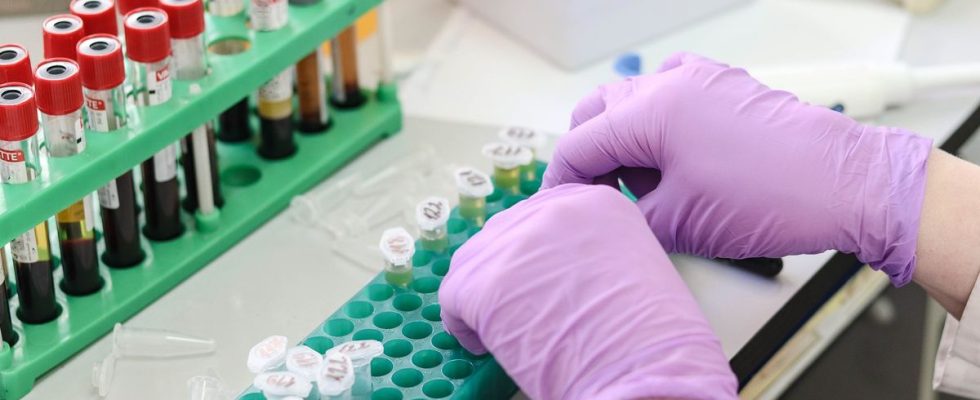Soon, a simple blood test might be enough. Scientists at the University of Gothenburg in Sweden have experimented with a blood test aimed at detecting Alzheimer’s disease. The results of their study were published this week in the American journal Jama Neurologyand they are promising.
Less painful and invasive, but also less expensive than the reference tests, this test could soon “revolutionize” the diagnosis of the disease, experts are already delighted. How does this test work? And what therapeutic advances could result from this? 20 minutes explains to you.
The search for a protein
As part of this study, carried out on 786 people with or without cognitive disorders, the researchers used the “ALZpath p-tau217” test to determine three groups among the participants: people likely, moderately likely and unlikely to have cognitive disorders. suffer from Alzheimer’s disease. For this, the test targets “the phosphorylated tau protein (p-tau217), which is a specific blood biomarker of Alzheimer’s disease,” explain the authors of the study.
Previous work on this same protein showed that it could be used to differentiate Alzheimer’s disease from other neurodegenerative disorders, and help detect the disease even in cases of mild cognitive impairment. Problem: The availability of these tests for research and clinical use is limited. The researchers’ objective was therefore to “determine the usefulness of the new ALZpath blood test already commercially available in order to detect Alzheimer’s disease”.
A promising alternative
If this study arouses so much enthusiasm, it is because the researchers discovered that this blood test offered a very high degree of precision, opening up a promising alternative to the reference tests used to make the diagnosis of the disease. “These results show that a blood test can accurately detect the presence of proteins that accumulate in the brain and cause Alzheimer’s disease,” commented Professor Charles Marshall, professor of clinical neurology at Queen Mary University. from London, to Science Media Center. In current practice, the only way to prove that a person has a buildup of these proteins in the brain is to have a lumbar puncture or PET scan. [une scintigraphie cérébrale amyloïde]which are only available in around one in twenty memory clinics in the UK.”
Very painful examinations for patients with regard to the first, which consists of an “examination of the cerebrospinal fluid, taken by lumbar puncture, in search of biological markers of the disease”, recalls Health Insurance. And very expensive, therefore less easily accessible, for the second, which makes it possible to “highlight a reduction in the functioning of the affected brain areas”.
But in the future, “80% of individuals could be diagnosed based on a blood test without any further investigation,” assured Dr Ashton. A step forward that is all the more interesting as “to receive [les derniers traitements freinant le déclin cognitif], you have to prove that you have amyloid in the brain, the study co-author continued. However, it is simply impossible to perform lumbar punctures and brain scans on everyone in the world who needs them. This is where the blood test [a] enormous potential.”
Earlier treatment of the disease
Another advantage of this blood test: it could allow earlier detection and treatment of the disease. “This study is an extremely welcome step, because it shows that blood tests can be just as accurate as more invasive and expensive tests in predicting whether a person has features of Alzheimer’s disease in their brain.” , rejoiced Dr Richard Oakley, director of research and innovation at the Alzheimer’s Society, to the Science Media Center.
An enthusiasm shared by Dr Sheona Scales, research director of the British association Alzheimer’s Research, who reminds the same media that “people with dementia are often faced with unacceptable delays in obtaining a diagnosis, and with new treatments finally on the horizon, it has never been more important to transform how people with potential symptoms of Alzheimer’s disease are diagnosed.” However, notes Dr. Oakley, “we need to do more research in different communities to understand the effectiveness of these blood tests in all people living with Alzheimer’s disease.” But “if these results are reproduced in real clinical contexts, the phosphorylated tau protein (p-tau217) has the potential to revolutionize the diagnosis of Alzheimer’s disease,” estimates Professor Jonathan M. Schott, professor of neurology at the center. dementia research in the UK.
In France, “around a million people would be affected by Alzheimer’s”, or “8% of French people over 65 who would be affected in 2020”, according to the Overcoming Alzheimer’s Foundationwhich “estimates that 225,000 new cases are diagnosed each year” in France.

